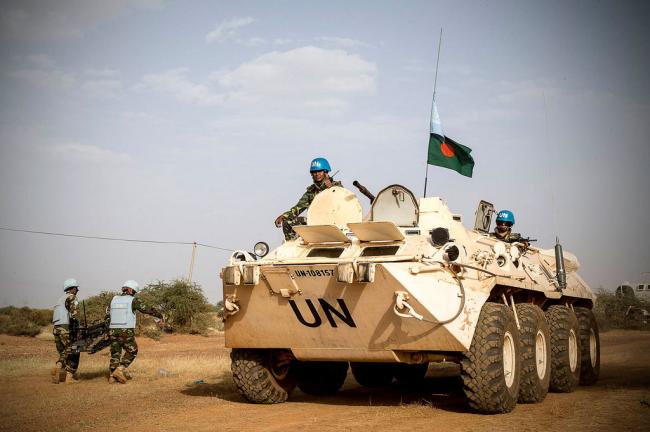
Stalled peace process, fresh ceasefire violations risk Mali’s stability – UN peacekeeping chief
“If the relative respite in recent months [leads us] to expect a possible improvement of the situation on the ground, we need to face the fact that persistent delays in the implementation of the peace agreement and new violations the ceasefire are incompatible with lasting stabilization, albeit partial, of the situation,” Under-Secretary-General for UN Peacekeeping Operations Hervé Ladsous told the Security Council.
He underscored: “Time has come to rise above their immediate, localized interests and think of the long-term concerns of their constituencies, as well as of the country as a whole.”
While he welcomed the announcement by President Ibrahim Boubacar Keïta to convene a ‘National Conference of Understanding’ in December to discuss the root causes of the conflict, strengthen ownership of the peace process and promote genuine national reconciliation, Ladsous said that unfortunately, at present, the parties to the peace agreement are yet to set their differences aside and sit down with Mahamat Saleh Annadif, the Secretary-General’s Special Representative, to prioritize implementation steps and finalize benchmarks and concrete timelines as requested by Security Council resolution 2295 (2016).
That resolution, which extended the mandate of the UN Multidimensional Integrated Stabilization Mission (MINUSMA), until 30 June 2017, also authorized an increase in MINUSMA’s capabilities, including a force level of up to 13,289 military personnel and 1,920 police personnel.
Under the terms of the resolution, the Council also decided that MINUSMA should perform tasks related to, among others, supporting the implementation of the peace agreement of June 2015; good offices and reconciliation; protection of civilians and stabilization, including against asymmetric threats; protection, safety and security of UN personnel; promotion and protection of human rights; and humanitarian assistance.
Impact of violence, instability on Mission effectiveness
Following the clashes in July in Kidal, in the north of the country, the Mission launched an operation to deter violence and protect civilians by showing a robust presence with patrols and checkpoints. In August, the Mission launched another operation, again establishing checkpoints and conducting coordinated patrols with the Malian armed forces along the Timbuktu–Douentza–Hombori axis, which spans from Timbuktu to the Mopti region.
However, in spite of the Mission doing its utmost, civilians continue to suffer from the consequences of the armed groups’ and Government’s military operations, he said.
The ceasefire violations have further hampered access for humanitarian actors that strive to answer to the most pressing needs of the population pending the resumption of basic public services.
MINUSMA continues to seek to enhance collaboration with Mali’s neighbours and regional security initiatives to more effectively address common security challenges. It is in this context that Annadif has been engaging the Governments of Burkina Faso, Chad, Mali, Mauritania and Niger, or so-called the G-5 Sahel member States.
The Mission, however, suffered a series of attacks on its force, including the May 29 detonation of an unidentified explosive device that killed five peacekeepers travelling in a convoy in the Mopti region, and the 3 October coordinated attacks in Kidal that killed one peacekeeper and injured eight others, reported Ladsous.
As tragically illustrated by Monday’s attacks, the Mission’s capacity to protect civilians and counter asymmetric attacks in active defence of its mandate is further hampered by the absence of the capabilities authorised by resolution 2295.
Ladsous said he regrets to inform the Security Council that in the short to medium-term instead of receiving reinforcements, MINUSMA will be confronted with the loss of key enablers, explaining that two troop-contributing countries have recently decided to withdraw three out of the Mission’s five helicopter units by early 2017.
The UN Secretariat has deployed extensive efforts to generate assets to replace them, but no Member State has so far committed to contribute any of the outstanding capabilities authorized either by resolution 2295 or by previous resolutions, he said.
Support for MINUSMA
Picking up that thread, Atul Khare, UN Under-Secretary-General for Field Support and head of the UN Department of Field Support (DFS), who also briefed the Council, stressed the importance for the Mission to be provided with the necessary capacities and capabilities required to operate safely and effectively in the current environment to be able to implement its mandate.
Highlighting that modern peacekeeping operations like MINUSMA require a range of new and stronger capabilities, he called on UN Member States to consider becoming ‘contingent owned equipment (COE) contributing countries;’ contributing to joint battalions; and partnering directly with troop and police contributing countries to provide the required equipment.
Khare also underlined that he continues to prioritize efforts to address sexual exploitation and abuse as well as all issues related to the conduct of UN personnel and further called on all Member States of the UN to ensure that their personnel uphold the highest standards of conduct and discipline as well as for timely reporting of incidents and follow-up action when necessary to ensure accountability.
He also informed the 15-member body of efforts being undertaken to enhance the Mission’s operational effectiveness, to strengthen security and protection of both civilian and uniformed staff, such as through reinforcing facilities against blasts and installing protected command positions and bunkers as well as to strengthen MINUSMA’s medical support plan, equipment and personnel.
Photo: MINUSMA/Harandane Dicko
Source: www.justearthnews.com
Support Our Journalism
We cannot do without you.. your contribution supports unbiased journalism
IBNS is not driven by any ism- not wokeism, not racism, not skewed secularism, not hyper right-wing or left liberal ideals, nor by any hardline religious beliefs or hyper nationalism. We want to serve you good old objective news, as they are. We do not judge or preach. We let people decide for themselves. We only try to present factual and well-sourced news.







